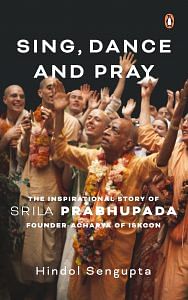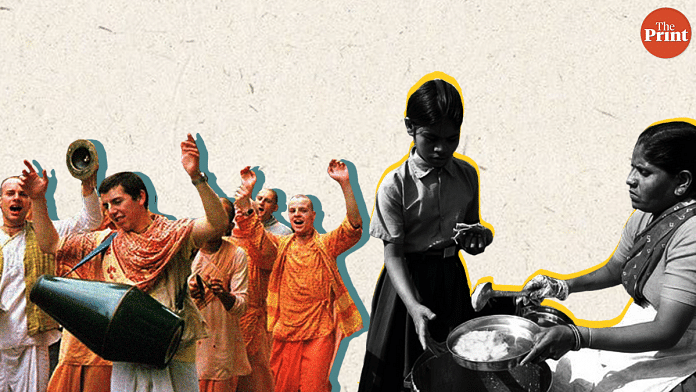This differentiation, this distancing, this humiliation was, no doubt, underlined ever more strongly because of a fellow student, only one year senior to Abhay—Subhas Chandra Bose. Bose had come to Scottish Church after being thrown out from the other elite educational institution of that time, Presidency College. He was quiet and studious, and yet a leopard cannot change its spots. Though nationalist campaigning was forbidden at Scottish Church, Bose and his fellow nationalists found ways to preach the gospel of independence. For Abhay this was unmissably part of his education.
Later he would remember Bose fondly and argued that it was Bose’s creation of the Indian National Army (INA) that compelled the British, with the fear of Indian soldiers rebelling throughout the country, to leave India.
In a conversation with guests in 1977, Srila Prabhupada recounted, ‘They [the British] knew that “we are not going [from India]. So long as the non-violence is there, we are safe” . . . But Subhas Bose’s protest was that “if you don’t take to violence, then these people are never going”. That was the difference of opinion between Subhas Bose and [the non-violent movement]. . . He managed to go out of India to Singapore . . . organized this INA.* And when the Britishers saw that “now the soldiers are [the] joining national movement, then we cannot rule over [India]”, then they decided, “let us make some compromise[s], and as much [as] possible, do harm. Divide this India [into], Pakistan and India, and go away”. This is [a] fact . . . So they decided that because without soldiers and police, how they can rule over [India]? And that, when they saw the soldiers are now joining Subhas Bose and they are planning to come to India from Imphal, so they saw, “now it is impossible”. They are politicians. They could understand . . . It is Subhas Bose’s INA which compelled them to go away.’*
Essentially, what Srila Prabhupada was arguing is that Gandhian non-violent tactics or techniques were not the only reason that British rule ended in India. The role of revolutionaries like Subhas Bose, who raised an army to fight colonial rule, also scared the British rulers, who realized that the loyalty of Indian soldiers to the British government could no longer be taken for granted.
Also Read: Akshaya Patra’s midday meal runs into yet another controversy over missing onion & garlic
As noted from the fervour of his words, there was always a revolutionary spirit in Srila Prabhupada, an admiration for the kshatriya†—a word he used often—spirit. But for himself, he found a different medium or channel to focus the desire for independence. His freedom had a higher purpose, the freedom to submit in his entirety to Krishna. He had noted disdain for Hindu philosophical concepts, like karma, among his British teachers and lessons that suggested that until the arrival of the British, Indian culture and civilization, indeed Hindu culture and civilization, was derelict and debauched.
It is important to remember that Abhay and his fellow students were being taught under the shadow of definitive (at that time, that is) books like James Mill’s History of British India (1818). Mill, who never visited India, never knew a single Indian language, yet went on to claim that ‘a duly qualified man can obtain more knowledge of India in one year in his closet in England than he could obtain during the course of the longest life, by the use of his eyes and ears in India’.3 Mill’s work described Hinduism as steeped in ugly superstition with not a redeeming feature in sight—and it was to seep into the colonial consciousness as the key understanding of the colonized. Historian Thomas Trautmann has noted that ‘James Mill’s highly influential History of British India (1818)—most particularly the long essay “Of the Hindus” comprising ten chapters—is the single most important source of British Indophobia and hostility to Orientalism.’ It is under this shadow that the colonial gaze fell on students like Subhas and Abhay.
Young Abhay was conscious of these biases, and he understood that things could change only when freedom came, and for the world to respect the treasures of his beloved Bhagavad Gita, it would have to be respected and promoted by the people in power at home first.
Also Read: Subhas Chandra Bose’s political ideas were always clear, not his constitutional imagination
There was already, before him even at that time, one man who was already showing such reverence. His name was Mahatma Gandhi. Gandhi always carried the Gita, noted Abhay, and spoke of it as having had the most important influence in his life. Abhay, the devout Vaishnava boy, also approved of Gandhi’s personal habits—his vegetarianism, his abstinence and his abhorrence of all intoxicants. Gandhi seemed like a man worth emulating. After all, imagined Abhay, a man devoted to the gospel of Krishna could not be wrong, could he?
In the meantime, in keeping with the traditions of the time, his parents worked to find a suitable bride for him, and she was discovered in Radharani Datta, suitable not merely in name, carrying as she did the name of the consort of Krishna, but also socially acceptable as she came from the same suvarna vanik community. She was eleven when they were wed and Abhay, twenty-two. There was also an examination to pass, a college to graduate from—and in this Abhay would show how sharply the revolutionary fire had burnt within him. Even though he took the examination and passed the course, when the time came for him to accept his degree, Abhay demurred.
No matter how important it might be for his career he would not accept a validation from the colonial masters. He had imbibed the non-violent path of protest and renunciation preached by Mahatma Gandhi.

This excerpt from ‘Sing, Dance and Pray’ written by Hindolal Sengupta has been published with the permission of Penguin Random House India.



